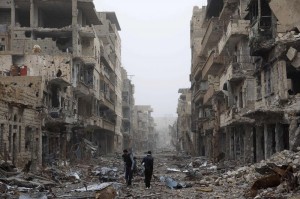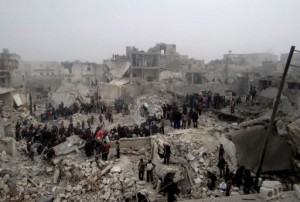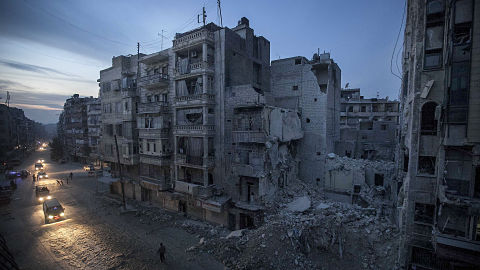There have been religious revolutions (most notably in ancient India, defining the East). There have been philosophical revolutions (most notably in ancient Greece, defining the West). There have been political revolutions (most notably in colonial America, defining modern democracy). But there has never bee a revolution of all three simultaneously, as there now can be in our unprecedented global society.
 Some in the American pundit class (especially those who refuse to see themselves as belonging to it) are already writing about the Syrian crisis in the past tense. As in “10 days that shook the world,” and Syria is “giving up its chemical weapons without a shot being fired,” and “all of this is a hugely positive leap from where we were a week, a month, or a year ago.”
Some in the American pundit class (especially those who refuse to see themselves as belonging to it) are already writing about the Syrian crisis in the past tense. As in “10 days that shook the world,” and Syria is “giving up its chemical weapons without a shot being fired,” and “all of this is a hugely positive leap from where we were a week, a month, or a year ago.”
All purportedly due to President Obama’s neglect and mishandling of the Syrian crisis, and backed, in this alternate universe, by “American exceptionalism.” Thus, the ‘lone remaining superpower,’ which couldn’t lead itself much less the world to consensus on the issue, was led by Russia, with Obama thrown a lifeline by Putin of all people. And we’re supposed to believe this prematurely celebrated outcome is a product of American leadership, rather than a sign of its demise.
In a deal hearkening back to the Cold War, which has ‘too little too late’ written all over it, America and Russia agreed to place the decision about whether to start World War III in the hands of an evil regime that’s gassed its own people.
“This is not a game,” Secretary of State John Kerry said. But that is precisely what it is.
The deal allows Obama, as head of the exceptional and indispensable nation of America, to pretend he’s still President of the World; and Putin to pretend he’s a peacemaker, with Russia still mattering as much in world affairs as the USSR did.
”There’s no diminution of options,” Kerry said, noting Obama’s right under U.S. law to order military action, with or without support from Congress or any international body. Given the upside-down lunacy of so-called international relations, it’s impossible to tell at this point whether that’s a credible threat, or a when-pigs-fly delusion.
Meanwhile, there’s the little matter of a three or four-sided civil war raging in Syria. A comment from a head of one of the rebel factions should keep the corks in the champagne: “Let Kerry-Lvov plan go to hell. We reject it and we will not protect the inspectors or let them enter Syria.”
That’s from one of the rebel groups that the statesman John McCain and his ilk want to arm. The guys who are really running the rebel show are al-Qaeda affiliated cretins called the al-Nusra Front. They’re going from town to town beheading people, with young children placed in front-row seats. But we can still arm the good guys, say the US warmongers. Right.
The former superpowers continue with arming-all-sides strategies, rather than employing what working, sort of—a humanitarian approach that takes seriously their ‘responsibility to protect’ civilians by creating  sanctuaries, safe corridors and no-fly zones. After all, humanitarian intervention is what moved this mess forward a bit, albeit through the threat of force.
sanctuaries, safe corridors and no-fly zones. After all, humanitarian intervention is what moved this mess forward a bit, albeit through the threat of force.
There is no path to disarmament without a path to peace. Whether this ‘framework’ will serve as a deterrent is up to Assad and his loose-cannon generals. But if it does, no matter what the timetables for chemical weapons disarmament, Obama should declare victory and stay at home, as the American people want.
Allow me to digress and offer an antidote to the West’s moral superiority. A little-known fact is that Winston Churchill ordered his generals to use chemical weapons on German cities after the Nazis started sending V-2 rockets and buzz bombs to terrorize London. To their credit, the British generals refused. Even Hitler, who had been a victim of mustard gas in World War I, refused to use chemical weapons, except of course on Jews, gypsies, homosexuals and other groups that he wanted to exterminate.
The American commander-in-chief and generals showed no such compunction with nuclear weapons against the prostrate enemy of Japan. And the American character has been steadily eroded in the decades since through the drip, drip, drip of propagandized rationalization that the bombs saved the lives of thousands of American soldiers. I doubt that’s the way God, however we conceive Her, tabulates it.
But even after the atomic bombings of Hiroshima and Nagasaki (the ultimate example of the use of weapons of mass destruction and the low watermark of man), there was enough exceptionality left in America to build a new world order.
The opposite of exceptionalism is not ordinariness, but mediocrity. Americans have turned the virtue of exceptionality into the vice of pride, and the virtue of being ordinary, the ‘salt of the earth,’ into the vice of superiority.
Mediocrity, on the other hand, is neither a virtue nor a vice, but rather what we got in Obama after the dark hole that Bush-Cheney put the nation. Sadly, Barack Obama has been a mediocre president at a moment of historical opportunity calling for greatness.
 Putin is right in saying that it’s a dangerous thing to tell a disengaged people they are exceptional. But it’s a dastardly thing to treat a smart people like children in need state control to keep them in line, as he does.
Putin is right in saying that it’s a dangerous thing to tell a disengaged people they are exceptional. But it’s a dastardly thing to treat a smart people like children in need state control to keep them in line, as he does.
If, as one commentator in the US said, “the real cost of destroying Assad’s chemical weapons is watching him crush the opposition and retain power,” then determining whether this agreement advances humanity is like debating how many devils dance on the head of a pin.
The fact is that the post World War II order is history. We’re in a conflict-ridden interregnum, a period between one order, and this small, most uncivil war in Syria could become a regional or even global conflagration.
Evil fills the vacuum when good cannot. But a world grown geographically and politically small is thinking small, when there’s the urgent necessity and possibility of thinking big. And because people were foolish enough to hope for big thinking from a conning candidate of hope and transformation, their cynicism has become self-fulfilling.
The “world’s oldest constitutional democracy” means nothing if the people perish, as we have in America. After all democracy, however bastardized its form, is based on the people. But when there’s a death, there can be a rebirth, or even something new can be born—but only if the death is fully and freely acknowledged.
The usually implicit separation and primacy of the political dimension is baldly and badly stated by a leading Canadian think tank CIGI: “How can we find solutions to these shared problems that are essentially political?” We can’t, as long as ‘we’ believe they are essentially political.
People can go from the spiritual and philosophical dimension to political expression, but not from political expression to a generative spiritual and philosophical dimension without deeper reflection.
The days that a ruler and government are free to commit whatever atrocity they see fit in the name of national security, be it Assad’s use of chemical weapons, Putin’s scorched earth policy toward Chechnya, or America’s invasion of Iraq, are over. Sovereignty is being redefined before our eyes politically, but it has to be redefined inwardly and philosophically. Simply put, sovereignty now belongs to humanity as a whole.
That’s at once a religiously, philosophically and politically revolutionary insight.
Martin LeFevre

